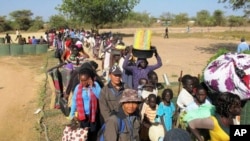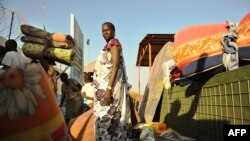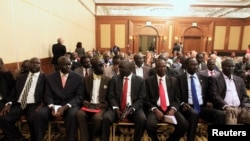The United Nations Security Council president said Friday that thousands of armed men have surrounded a U.N. base in Bor, the capital of Jonglei state in South Sudan, where some 14,000 civilians have taken shelter.
The tense incident came a day after two U.N. peacekeepers and 11 South Sudanese civilians were killed when around 2,000 youths from the Nuer ethnic group surrounded a U.N. base in Akobo, in eastern Jonglei state, and opened fire.
The civilians who died in that attack were part of a group of 32 ethnic Dinka who had sought shelter at the Akobo base as violence that began in Juba on Sunday spread outside the capital.
President Salva Kiir, a Dinka, has blamed the violence on a failed coup, which he said was organized by former vice president Riek Machar, a member of the Nuer ethnic group.
Officials have been trying to quell rising ethnic tensions, and Machar has denied that he had anything to do with the unrest, which has claimed at least 500 lives in the capital alone.
Speaking to reporters after an emergency session of the Security Council, Gerard Araud, France's permanent representative to the United Nations and the president of the Security Council, urged the parties to the conflict to stop fighting and go to the negotiating table before the crisis spirals out of control.
In an audio statement released Friday, addressed directly to the South Sudanese people, President Barack Obama's National Security Adviser Susan Rice warned that "continued fighting -- and the specter of ethnic violence -- could tear apart the nation you so painstakingly knit together."
"We know all too well what horrors can occur when irresponsible provocateurs pit tribe against tribe and brother against brother," she said, urging "everyone to step back from conflict and instead address your differences through peaceful dialogue."
The United Nations said some 35,000 internally displaced persons (IDPs) have sought refuge at U.N. compounds in Juba, Bor and Bentiu, the capital of oil-rich Unity state, since the start of the violence.
“South Sudan will face a large displacement and protection crisis if the situation is not managed with restraint or if political dialogue does not take place,” the United Nations Special Rapporteur on the human rights of IDPs, Chaloka Beyani, warned.
The United States has deployed 45 Marines to Juba to provide additional security at the embassy.
VOA White House correspondent Dan Robinson said the deployment was "standard procedure in these types of situations in terms of securing Americans in these areas."
The troops will remain in South Sudan until the security situation has improved, he said.
Bor residents said an unknown number of people were killed in fighting on Thursday.
The bodies of the dead were still lying in the streets because there was no one there to dispose of them after Red Cross officials "had to run for their lives" in the midst of the fighting, government spokesman Michael Makuei Lueth said.
Residents said shops and houses in Bor were looted and destroyed and thousands of people fled into the bush or to the U.N. compound, fearing for their lives.
In Unity state, four people including two high-ranking SPLA officers were killed when armed men attacked the SPLA barracks there on Thursday, officials said.
SPLA Division Commander James Koang Chuol said fighting at the barracks lasted for three hours and sparked panic in the nearby towns of Bentiu and Rubknotna, but the army was able to retain control in the state.
In Juba, a delegation of ministers from the Intergovernmental Authority on Development (IGAD) held talks with President Salva Kiir, aimed at ending the violence.
Ethiopian Foreign Minister, Tedros Adhanom Ghebreyesus, who is leading the IGAD delegation, called the meeting with Kiir "productive" and said more talks are planned, although he did not say when they might be held.
Somali Foreign minister Fowzia Yusuf Adam, who is part the IGAD team, told VOA News that the delegation plans to meet with everyone involved in the conflict, including Machar.
The IGAD ministers are “very hopeful that both sides will put aside their differences and sit at the table to discuss their issues,” she said.
Makuei said the government is committed to ending the violence.
“We have given the green light to this team to continue with their efforts in order to bring peace to South Sudan. However, the most important is to see how best we can stop all these atrocities that are being committed, especially in Jonglei state," the government spokesman said.
The tense incident came a day after two U.N. peacekeepers and 11 South Sudanese civilians were killed when around 2,000 youths from the Nuer ethnic group surrounded a U.N. base in Akobo, in eastern Jonglei state, and opened fire.
The civilians who died in that attack were part of a group of 32 ethnic Dinka who had sought shelter at the Akobo base as violence that began in Juba on Sunday spread outside the capital.
President Salva Kiir, a Dinka, has blamed the violence on a failed coup, which he said was organized by former vice president Riek Machar, a member of the Nuer ethnic group.
Officials have been trying to quell rising ethnic tensions, and Machar has denied that he had anything to do with the unrest, which has claimed at least 500 lives in the capital alone.
Speaking to reporters after an emergency session of the Security Council, Gerard Araud, France's permanent representative to the United Nations and the president of the Security Council, urged the parties to the conflict to stop fighting and go to the negotiating table before the crisis spirals out of control.
In an audio statement released Friday, addressed directly to the South Sudanese people, President Barack Obama's National Security Adviser Susan Rice warned that "continued fighting -- and the specter of ethnic violence -- could tear apart the nation you so painstakingly knit together."
"We know all too well what horrors can occur when irresponsible provocateurs pit tribe against tribe and brother against brother," she said, urging "everyone to step back from conflict and instead address your differences through peaceful dialogue."
UN Sheltering 35,000
The United Nations said some 35,000 internally displaced persons (IDPs) have sought refuge at U.N. compounds in Juba, Bor and Bentiu, the capital of oil-rich Unity state, since the start of the violence.
“South Sudan will face a large displacement and protection crisis if the situation is not managed with restraint or if political dialogue does not take place,” the United Nations Special Rapporteur on the human rights of IDPs, Chaloka Beyani, warned.
The United States has deployed 45 Marines to Juba to provide additional security at the embassy.
VOA White House correspondent Dan Robinson said the deployment was "standard procedure in these types of situations in terms of securing Americans in these areas."
The troops will remain in South Sudan until the security situation has improved, he said.
Bor residents said an unknown number of people were killed in fighting on Thursday.
The bodies of the dead were still lying in the streets because there was no one there to dispose of them after Red Cross officials "had to run for their lives" in the midst of the fighting, government spokesman Michael Makuei Lueth said.
Residents said shops and houses in Bor were looted and destroyed and thousands of people fled into the bush or to the U.N. compound, fearing for their lives.
In Unity state, four people including two high-ranking SPLA officers were killed when armed men attacked the SPLA barracks there on Thursday, officials said.
SPLA Division Commander James Koang Chuol said fighting at the barracks lasted for three hours and sparked panic in the nearby towns of Bentiu and Rubknotna, but the army was able to retain control in the state.
In Juba, a delegation of ministers from the Intergovernmental Authority on Development (IGAD) held talks with President Salva Kiir, aimed at ending the violence.
Ethiopian Foreign Minister, Tedros Adhanom Ghebreyesus, who is leading the IGAD delegation, called the meeting with Kiir "productive" and said more talks are planned, although he did not say when they might be held.
Somali Foreign minister Fowzia Yusuf Adam, who is part the IGAD team, told VOA News that the delegation plans to meet with everyone involved in the conflict, including Machar.
The IGAD ministers are “very hopeful that both sides will put aside their differences and sit at the table to discuss their issues,” she said.
Makuei said the government is committed to ending the violence.
“We have given the green light to this team to continue with their efforts in order to bring peace to South Sudan. However, the most important is to see how best we can stop all these atrocities that are being committed, especially in Jonglei state," the government spokesman said.










